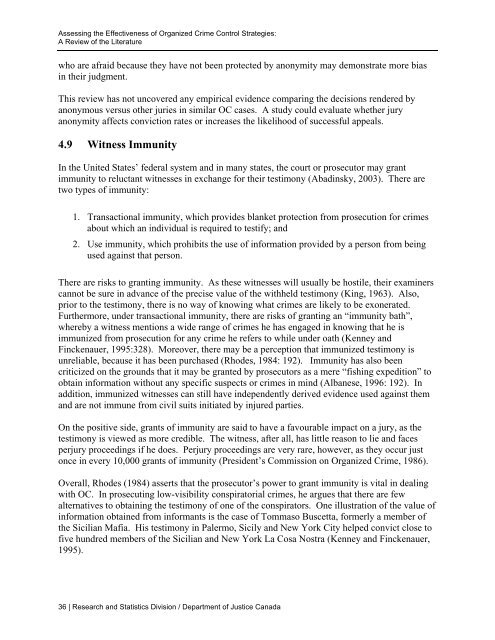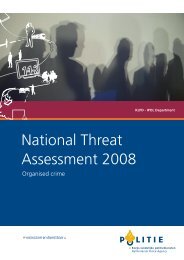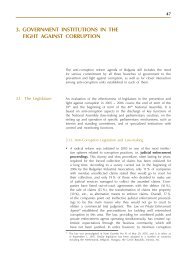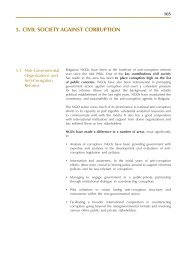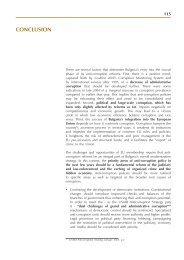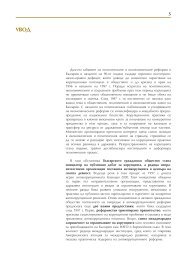Assessing the Effectiveness of Organized Crime Control Strategies ...
Assessing the Effectiveness of Organized Crime Control Strategies ...
Assessing the Effectiveness of Organized Crime Control Strategies ...
Create successful ePaper yourself
Turn your PDF publications into a flip-book with our unique Google optimized e-Paper software.
<strong>Assessing</strong> <strong>the</strong> <strong>Effectiveness</strong> <strong>of</strong> <strong>Organized</strong> <strong>Crime</strong> <strong>Control</strong> <strong>Strategies</strong>:<br />
A Review <strong>of</strong> <strong>the</strong> Literature<br />
who are afraid because <strong>the</strong>y have not been protected by anonymity may demonstrate more bias<br />
in <strong>the</strong>ir judgment.<br />
This review has not uncovered any empirical evidence comparing <strong>the</strong> decisions rendered by<br />
anonymous versus o<strong>the</strong>r juries in similar OC cases. A study could evaluate whe<strong>the</strong>r jury<br />
anonymity affects conviction rates or increases <strong>the</strong> likelihood <strong>of</strong> successful appeals.<br />
4.9 Witness Immunity<br />
In <strong>the</strong> United States’ federal system and in many states, <strong>the</strong> court or prosecutor may grant<br />
immunity to reluctant witnesses in exchange for <strong>the</strong>ir testimony (Abadinsky, 2003). There are<br />
two types <strong>of</strong> immunity:<br />
1. Transactional immunity, which provides blanket protection from prosecution for crimes<br />
about which an individual is required to testify; and<br />
2. Use immunity, which prohibits <strong>the</strong> use <strong>of</strong> information provided by a person from being<br />
used against that person.<br />
There are risks to granting immunity. As <strong>the</strong>se witnesses will usually be hostile, <strong>the</strong>ir examiners<br />
cannot be sure in advance <strong>of</strong> <strong>the</strong> precise value <strong>of</strong> <strong>the</strong> withheld testimony (King, 1963). Also,<br />
prior to <strong>the</strong> testimony, <strong>the</strong>re is no way <strong>of</strong> knowing what crimes are likely to be exonerated.<br />
Fur<strong>the</strong>rmore, under transactional immunity, <strong>the</strong>re are risks <strong>of</strong> granting an “immunity bath”,<br />
whereby a witness mentions a wide range <strong>of</strong> crimes he has engaged in knowing that he is<br />
immunized from prosecution for any crime he refers to while under oath (Kenney and<br />
Finckenauer, 1995:328). Moreover, <strong>the</strong>re may be a perception that immunized testimony is<br />
unreliable, because it has been purchased (Rhodes, 1984: 192). Immunity has also been<br />
criticized on <strong>the</strong> grounds that it may be granted by prosecutors as a mere “fishing expedition” to<br />
obtain information without any specific suspects or crimes in mind (Albanese, 1996: 192). In<br />
addition, immunized witnesses can still have independently derived evidence used against <strong>the</strong>m<br />
and are not immune from civil suits initiated by injured parties.<br />
On <strong>the</strong> positive side, grants <strong>of</strong> immunity are said to have a favourable impact on a jury, as <strong>the</strong><br />
testimony is viewed as more credible. The witness, after all, has little reason to lie and faces<br />
perjury proceedings if he does. Perjury proceedings are very rare, however, as <strong>the</strong>y occur just<br />
once in every 10,000 grants <strong>of</strong> immunity (President’s Commission on <strong>Organized</strong> <strong>Crime</strong>, 1986).<br />
Overall, Rhodes (1984) asserts that <strong>the</strong> prosecutor’s power to grant immunity is vital in dealing<br />
with OC. In prosecuting low-visibility conspiratorial crimes, he argues that <strong>the</strong>re are few<br />
alternatives to obtaining <strong>the</strong> testimony <strong>of</strong> one <strong>of</strong> <strong>the</strong> conspirators. One illustration <strong>of</strong> <strong>the</strong> value <strong>of</strong><br />
information obtained from informants is <strong>the</strong> case <strong>of</strong> Tommaso Buscetta, formerly a member <strong>of</strong><br />
<strong>the</strong> Sicilian Mafia. His testimony in Palermo, Sicily and New York City helped convict close to<br />
five hundred members <strong>of</strong> <strong>the</strong> Sicilian and New York La Cosa Nostra (Kenney and Finckenauer,<br />
1995).<br />
36 | Research and Statistics Division / Department <strong>of</strong> Justice Canada


